商务与管理沟通测试题(2)
管理沟通技能考试卷

管理沟通技能考试卷第一部分:选择题(每题2分,共40分)1.什么是有效的沟通?A. 信息传递的方式B. 达到预期目标的交流C. 言语表达的流畅度D. 没有正确答案2.下列哪项不是良好的沟通技巧?A. 善于倾听B. 发表个人观点时带有偏见C. 使用简单易懂的语言D. 主动表达自己的想法3.沟通的关键是什么?A. 表达清晰B. 肢体语言C. 定期发送邮件D. 画图表达4.下列哪项不是有效的沟通策略?A. 及时反馈B. 没有回应别人的信息C. 换位思考D. 直接表达意见5.沟通中的“四心”原则是指?A. 用心、细心、耐心、善心B. 互相信任、互相尊重、互相理解、互相支持C. 口头和书面沟通工具的应用D. 手势、表情、肢体的利用……第二部分:简答题(每题10分,共30分)1.请简要解释什么是主动倾听,并列举3个主动倾听的技巧。
2.为什么在管理中,沟通技能是至关重要的,如何提升管理沟通技巧?3.解释什么是非暴力沟通(Nonviolent Communication),它如何有助于解决管理中的冲突?第三部分:应用题(每题10分,共30分)1.请描述一种你在实际工作中遇到的沟通问题,并提出两种解决方案。
2.你正在与团队合作一个项目,发现团队成员之间存在沟通不畅的情况,如何帮助团队建立更好的沟通?3.假设你是一家公司的领导者,现在公司即将进行一项重要的变革,请设计一个沟通计划,确保变革顺利实施并员工的理解和支持。
以上是本次管理沟通技能考试卷的内容,请同学们仔细阅读题目后作答。
祝你们顺利通过考试!。
商务运营管理第二章练习及答案

一、单项选择题1.处于企业工作的中心地位的是()A.如何确保公司生产的产品得到顾客的欢迎B.如何确保企业生产出标准化的产品C.如何确保获得企业预期的利润D.如何确保顾客获得满足他们质量权益的产品和服务答:D解析:p39。
运营管理中最重要的问题之一是:如何确保顾客获得满足他们质量权益的产品和服务,它处于企业工作的中心地位。
2.以下关于产品质量定义的说法中,最为准确的是()A.质量是顾客对产品的欢迎程度B.质量是企业生产产品的合格率C.质量是顾客需求的实际满足程度D.质量是企业生产出具有同行业领先技术的产品答:C解析:P41,记忆题型。
3.以下关于符合性质量观点的说法中,正确的是()A.符合性质量关注的是预期性能和承诺性能之间的关系B.符合性质量关注的是实际性能和许诺性能之间的关系C.符合性质量关注的是预期性能和实际性能之间的关系D.符合性质关注的是许诺性能和预期性能之间的关系答:B解析:P41,记忆题型。
4.下列关于顾客与产品质量的说法中,错误的是()A.为了满足顾客需要,与顾客沟通成为质量交付系统的一个关键事项B.一件产品可能符合协商一致的要求,但是顾客仍有可能对购买到的产品不满意C.公司通过货币价值途径实现顾客质量意味着他们真正地满足了顾客的需要D.即使生产者保持使产品完全满足顾客的需要,也无法避免顾客对产品不满意情况的发生答:C解析:P41-42;现实中,顾客通过价格购买到了产品,并不意味着真正满足了顾客真正的需要。
比如,在网上平台的买家秀,有时候并没能真的满足了顾客的虚荣心理。
5.运营可以通过两种直接的方式促进提供高质量的产品,一种方式是将运营活动作为单独的活动,另外一种方式是()A.基于运营和生产管理的关系B.基于运营和营销的关系C.基于运营和财务管理的关系D.基于运营和其他管理职能的传统关系答:D解析:P42,记忆题型。
6.关于传统的追求质量方法的观点中,以下说法错误的是()A.关于运营和其他管理职能的关系,传统的观点支持职能分离B.传统的思想以生产率和质量之间的权横为中心C.维持高质量标准与大规模生产和低成本生产是完全一致的D.产品转化应与其他活动分开答:C解析:P42-43;维持高质量标准与大规模生产和低成本生产是完全一致的。
商务沟通与谈判技巧测试 选择题 60题

1. 在商务沟通中,以下哪项不是有效倾听的特征?A. 打断对方B. 保持眼神接触C. 避免干扰D. 给予反馈2. 当你在谈判中遇到僵局时,最好的策略是什么?A. 坚持立场B. 暂时休会C. 立即妥协D. 提高报价3. 在商务邮件中,以下哪项是最佳的开头方式?A. 直接进入主题B. 使用非正式问候C. 使用正式问候D. 不使用问候语4. 以下哪项是商务谈判中的“BATNA”(最佳替代方案)的定义?A. 谈判中的最佳结果B. 谈判中的最差结果C. 谈判失败后的替代方案D. 谈判中的初始方案5. 在商务沟通中,以下哪项是建立信任的关键因素?A. 保持神秘感B. 频繁改变立场C. 诚实和透明D. 使用专业术语6. 当你需要说服对方接受你的提案时,以下哪项技巧最有效?A. 威胁对方B. 提供证据支持C. 情感诉求D. 贬低对方7. 在商务谈判中,以下哪项是“双赢”策略的特征?A. 一方完全胜利B. 双方都有所收获C. 一方完全失败D. 双方都不满意8. 在商务沟通中,以下哪项是有效的非语言沟通方式?A. 频繁看手机B. 保持开放的姿势C. 交叉双臂D. 避免眼神接触9. 当你在谈判中需要提出一个敏感问题时,最佳的做法是什么?A. 直接提出B. 委婉提出C. 不提出D. 通过第三方提出10. 在商务邮件中,以下哪项是最佳的结尾方式?A. 不明确表示下一步行动B. 使用非正式结束语C. 明确表示下一步行动D. 不使用结束语11. 在商务沟通中,以下哪项是有效的时间管理技巧?A. 拖延决策B. 设定截止日期C. 无限期推迟D. 不设定优先级12. 当你在谈判中需要处理对方的反对意见时,最佳的做法是什么?A. 忽视反对意见B. 直接反驳C. 倾听并回应D. 提高报价13. 在商务沟通中,以下哪项是建立良好关系的有效方法?A. 保持距离B. 频繁批评C. 分享个人信息D. 避免闲聊14. 当你在谈判中需要提出一个高报价时,最佳的做法是什么?A. 直接提出B. 逐步提出C. 不提出D. 通过第三方提出15. 在商务邮件中,以下哪项是最佳的格式规范?A. 不使用段落B. 使用非正式语言C. 清晰的分段D. 不使用标点符号16. 在商务沟通中,以下哪项是有效的情绪管理技巧?A. 情绪爆发B. 保持冷静C. 避免表达情绪D. 频繁改变情绪17. 当你在谈判中需要处理对方的压力时,最佳的做法是什么?A. 增加压力B. 忽视压力C. 理解并回应D. 提高报价18. 在商务沟通中,以下哪项是建立专业形象的有效方法?A. 穿着随意B. 使用非正式语言C. 保持专业态度D. 避免专业术语19. 当你在谈判中需要提出一个低报价时,最佳的做法是什么?A. 直接提出B. 逐步提出C. 不提出D. 通过第三方提出20. 在商务邮件中,以下哪项是最佳的语气选择?A. 命令式B. 非正式C. 正式D. 讽刺21. 在商务沟通中,以下哪项是有效的信息传递技巧?A. 模糊不清B. 直接明确C. 避免细节D. 使用复杂术语22. 当你在谈判中需要处理对方的情绪时,最佳的做法是什么?A. 忽视情绪B. 直接反驳C. 倾听并回应D. 提高报价23. 在商务沟通中,以下哪项是建立合作关系的有效方法?A. 保持竞争B. 频繁批评C. 分享目标D. 避免合作24. 当你在谈判中需要提出一个复杂提案时,最佳的做法是什么?A. 直接提出B. 逐步提出C. 不提出D. 通过第三方提出25. 在商务邮件中,以下哪项是最佳的结构安排?A. 不使用标题B. 使用非正式结构C. 清晰的分段D. 不使用标点符号26. 在商务沟通中,以下哪项是有效的冲突解决技巧?A. 避免冲突B. 直接对抗C. 寻求共同点D. 提高报价27. 当你在谈判中需要处理对方的疑虑时,最佳的做法是什么?A. 忽视疑虑B. 直接反驳C. 倾听并回应D. 提高报价28. 在商务沟通中,以下哪项是建立信任的有效方法?A. 保持神秘感B. 频繁改变立场C. 诚实和透明D. 使用专业术语29. 当你在谈判中需要提出一个创新提案时,最佳的做法是什么?A. 直接提出B. 逐步提出C. 不提出D. 通过第三方提出30. 在商务邮件中,以下哪项是最佳的语法规范?A. 不使用标点B. 使用非正式语法C. 正确的语法D. 不使用大写字母31. 在商务沟通中,以下哪项是有效的决策技巧?A. 拖延决策B. 快速决策C. 集体决策D. 不设定优先级32. 当你在谈判中需要处理对方的压力时,最佳的做法是什么?A. 增加压力B. 忽视压力C. 理解并回应D. 提高报价33. 在商务沟通中,以下哪项是建立专业形象的有效方法?A. 穿着随意B. 使用非正式语言C. 保持专业态度D. 避免专业术语34. 当你在谈判中需要提出一个低报价时,最佳的做法是什么?A. 直接提出B. 逐步提出C. 不提出D. 通过第三方提出35. 在商务邮件中,以下哪项是最佳的语气选择?A. 命令式B. 非正式C. 正式D. 讽刺36. 在商务沟通中,以下哪项是有效的信息传递技巧?A. 模糊不清B. 直接明确C. 避免细节D. 使用复杂术语37. 当你在谈判中需要处理对方的情绪时,最佳的做法是什么?A. 忽视情绪B. 直接反驳C. 倾听并回应D. 提高报价38. 在商务沟通中,以下哪项是建立合作关系的有效方法?A. 保持竞争B. 频繁批评C. 分享目标D. 避免合作39. 当你在谈判中需要提出一个复杂提案时,最佳的做法是什么?A. 直接提出B. 逐步提出C. 不提出D. 通过第三方提出40. 在商务邮件中,以下哪项是最佳的结构安排?A. 不使用标题B. 使用非正式结构C. 清晰的分段D. 不使用标点符号41. 在商务沟通中,以下哪项是有效的冲突解决技巧?A. 避免冲突B. 直接对抗C. 寻求共同点D. 提高报价42. 当你在谈判中需要处理对方的疑虑时,最佳的做法是什么?A. 忽视疑虑B. 直接反驳C. 倾听并回应D. 提高报价43. 在商务沟通中,以下哪项是建立信任的有效方法?A. 保持神秘感B. 频繁改变立场C. 诚实和透明D. 使用专业术语44. 当你在谈判中需要提出一个创新提案时,最佳的做法是什么?A. 直接提出B. 逐步提出C. 不提出D. 通过第三方提出45. 在商务邮件中,以下哪项是最佳的语法规范?A. 不使用标点B. 使用非正式语法C. 正确的语法D. 不使用大写字母46. 在商务沟通中,以下哪项是有效的决策技巧?A. 拖延决策B. 快速决策C. 集体决策D. 不设定优先级47. 当你在谈判中需要处理对方的压力时,最佳的做法是什么?A. 增加压力B. 忽视压力C. 理解并回应D. 提高报价48. 在商务沟通中,以下哪项是建立专业形象的有效方法?A. 穿着随意B. 使用非正式语言C. 保持专业态度D. 避免专业术语49. 当你在谈判中需要提出一个低报价时,最佳的做法是什么?A. 直接提出B. 逐步提出C. 不提出D. 通过第三方提出50. 在商务邮件中,以下哪项是最佳的语气选择?A. 命令式B. 非正式C. 正式D. 讽刺51. 在商务沟通中,以下哪项是有效的信息传递技巧?A. 模糊不清B. 直接明确C. 避免细节D. 使用复杂术语52. 当你在谈判中需要处理对方的情绪时,最佳的做法是什么?A. 忽视情绪B. 直接反驳C. 倾听并回应D. 提高报价53. 在商务沟通中,以下哪项是建立合作关系的有效方法?A. 保持竞争B. 频繁批评C. 分享目标D. 避免合作54. 当你在谈判中需要提出一个复杂提案时,最佳的做法是什么?A. 直接提出B. 逐步提出C. 不提出D. 通过第三方提出55. 在商务邮件中,以下哪项是最佳的结构安排?A. 不使用标题B. 使用非正式结构C. 清晰的分段D. 不使用标点符号56. 在商务沟通中,以下哪项是有效的冲突解决技巧?A. 避免冲突B. 直接对抗C. 寻求共同点D. 提高报价57. 当你在谈判中需要处理对方的疑虑时,最佳的做法是什么?A. 忽视疑虑B. 直接反驳C. 倾听并回应D. 提高报价58. 在商务沟通中,以下哪项是建立信任的有效方法?A. 保持神秘感B. 频繁改变立场C. 诚实和透明D. 使用专业术语59. 当你在谈判中需要提出一个创新提案时,最佳的做法是什么?A. 直接提出B. 逐步提出C. 不提出D. 通过第三方提出60. 在商务邮件中,以下哪项是最佳的语法规范?A. 不使用标点B. 使用非正式语法C. 正确的语法D. 不使用大写字母1. A2. B3. C4. C5. C6. B7. B8. B9. B10. C11. B12. C13. C14. B15. C16. B17. C18. C19. B20. C21. B22. C23. C24. B25. C26. C27. C28. C29. B30. C31. C32. C33. C34. B35. C36. B37. C38. C39. B40. C41. C42. C43. C44. B45. C46. C47. C48. C49. B51. B52. C53. C54. B55. C56. C57. C58. C59. B60. C。
沟通与谈判模拟考试题+答案

沟通与谈判模拟考试题+答案一、单选题(共30题,每题1分,共30分)1、购物环境和商品陈列心理等是下列销售心理学研究的哪一内容()A、消费者心理B、销售策略心理C、销售者心理D、购买动机心理正确答案:B2、销售心理学研究任务中最重要的内容是()A、销售者心理B、销售策略心理C、消费者心理D、销售策略正确答案:C3、对于观察法下列描述错误的是()A、观察法可以说是研究消费行为的最基本方法,也是现代科学运用最广泛的方法B、自然环境下的观察可以用来研究广告的效果,观察人们对各个广告的注意程度C、观察法的优点之一是可以获得直观真实而有价值的研究材料D、有效观察最为重要的条件是观察所得的材料的真实性与代表性正确答案:B4、遵循原则,不仅要求阐明销售活动中已经形成的心理现象,还要阐明那些潜在的或刚刚发生的心理现象()A、客观性原则B、发展性原则C、联系性原则D、实践性原则正确答案:B5、除具备一般谈判人员必须具备的素养外,还应阅历丰富、目光远大,具有审时度势、机应变、当机立断的能力,以及善于控制与协调谈判小组成员的能力。
()A、首席代表B、财务人员C、业务熟练的商务人员D、技术精湛的专业技术人员正确答案:A6、交换文本时各方签字人应热烈握手,互致祝贺,并互换方才用过的(),以志纪念。
A、签字笔B、名片C、文件夹D、文本正确答案:A7、下列说法错误的是()A、销售策略心理也是销售心理学研究的重要内容B、销售者心理是销售心理学研究中不可缺少的内容C、销售心理学把研究消费者心理作为最主要的内容D、销售心理学是以销售者的心理活动作为研究对象,而对消费者心理活动的探索与剖析,则构成该学科的主要研究内容正确答案:D8、负责准确、完整、及时记录谈判内容的谈判成员是()。
A、首席代表B、业务熟练的商务人员C、记录员D、专业技术人员正确答案:B9、消费者通过对各家商店进行分析对比后,会认识到凡是服务质量优质的商店,其管理经营水平也一定较高,所经营的商品可信度也大,从而对商店产生信任感,增强了到该商场的购物兴趣。
商务沟通英语测试

4.团队发展的风暴阶段指的是()攻击一个大目标,如“攻占城堡”。
当一个团队因为内部冲突而解散时。
当一个团队因为完成了它的主要目标而解散时。
当团队成员定义和适应他们的角色时,分歧和不确定性自然会上升。
Storming: As team members begin to discuss their positions and become more assertive in establishing their roles,disagreements and uncertainties are natural in this phase.【课本P185】风暴:当团队成员开始讨论他们的立场,并在确立自己的角色时变得更加自信时,分歧和不确定性在这个阶段是很自然的。
5. (单选题) Which of these is not listed in the Chapter 3 as one of the potential disadvantages of virtual这个建议显示出缺乏商业洞察力。
您可能会看到是否有一种方法可以用更简单的语言来传达这个消息。
Destructive feedback is little more than complaining or bullying.破坏性的反馈只不过是抱怨或欺凌。
【课本P196】7.What is the written record of the discussion points and decisions from a meeting called?11. (单选题) As a general rule, how many parts should be set aside roughly to optimize your writing time?12. (单选题)If you were to write an email message to a manufacturer complaining about a defective product and asking for a refund, your general purpose would be如果你要写一封电子邮件给一个制造商抱怨有缺陷的产品并要求退款,你的一般目的是A通知B说服C合作D招待13. (单选题) The purpose of limiting your scope when planning a writing project is to14. (单选题)To make sure you have provided all the necessary information, use the journalistic approach, which is to15. (单选题)Which of these is a reason the discovery technique of free writing can help you find your focus when starting a project?16.(单选题)No matter what the message is or the audience you want to reach, you should always。
商务沟通习题与标准答案

商务沟通习题与标准答案第一篇:商务沟通习题与标准答案一、单项选择题1、信息受众不仅要能够广泛、深入明了信息的性质、含义、用途和影响,而且要认同、同意信息的内容是沟通目标中的(B)A.理解B.接受C.传递D.行动2、发信者将信息译成可以传递的符号形式的过程是(B)A.反馈B.解码C.编码D.媒介3、(B)是管理的最基本最重要的重要职能。
A.员工管理B.组织沟通C.薪酬管理D.绩效管理4、影响群体沟通效率的不可控因素不包括(D)A.群体因素B.环境因素C.任务因素D.领导风格5、谈判进行中,各方的主谈人员在自己一方居中而坐,其他人员遵循(B)的原则,依职位高低自近而远分别在主谈人员的两侧就座。
A.左高右低B.右高左低C.对门为上D.自由择座6、有时为了加快信息的传递,财务部的主管会计与等级比他高的销售经理之间需要进行沟通,这就是(A)A.上行沟通B.下行沟通C.平行沟通D.斜向沟通7、下列交谈方式中,正确运用了交谈技巧的是(B)A.话题乏味B.主动地、适当地赞美别人C.把先到的客人介绍给后到的客人D.对别人的谈话反应冷淡8.为他人作介绍时必须遵守的规则是(C)A.卑者优先B.男士优先C.女士优先D.尊者优先9、初次见面,鞠躬90度角并用敬语是以下哪个国家的习惯(C)A.韩国B.中国C.日本D.法国10.谈判进行中,各方的主谈人员在自己一方居中而坐,其他人员遵循_____的原则,依职位高低自近而远分别在主谈人员的两侧就座。
(B)A.左高右低B.右高左低C.对门为上D.自由择座11、人际距离中私人距离是指人际间距为(B)A.0.15~0.5米B.0.5~1.5米C.1.5米以上D.4米以上12、下列倾听者的哪种非语言符号不能给讲话者一种支持和鼓励的表示(D)A.微笑B.注视讲话者C.轻轻点头D.昂头13、“按你的说法,这样做不够合理?”这句问话属于(A)A.重复性提问B.假设性提问C.直接性提问D.引导性提问14、下列选项中属于非正式沟通的是(D)A.组织之间的公函往来B文件下达C上级指示D.组织成员之间的私下交谈15、下列说法中不正确的是(B)A.孤立的与外界没有任何关系的组织系统实际上是不存在的。
商业情商测试题及答案(3篇)

第1篇一、选择题(每题2分,共20分)1. 当你面对一个客户时,以下哪种态度最有利于你建立良好的关系?A. 对客户的要求置之不理B. 对客户的要求表示理解,但无法满足C. 对客户的要求表示理解,并尽力满足D. 对客户的要求表示冷漠答案:C2. 在一次商务会议中,你发现其他成员对你的观点表示怀疑。
以下哪种做法最有助于你改变他们的看法?A. 强烈反驳他们的观点B. 保持沉默,等待他们改变看法C. 以理服人,用事实和数据进行说明D. 轻视他们的观点,认为自己是对的答案:C3. 当你与合作伙伴发生争执时,以下哪种做法最有利于解决问题?A. 坚持自己的观点,不让步B. 保持沉默,等待对方让步C. 倾听对方的观点,寻找共同点D. 轻视对方的观点,认为自己是对的答案:C4. 在一次商务谈判中,对方提出了一个不合理的要求。
以下哪种做法最有利于你应对?A. 直接拒绝对方的要求B. 对方的要求表示理解,但无法满足C. 以理服人,用事实和数据进行说明D. 与对方争论,试图说服他们放弃要求答案:C5. 当你发现团队成员在工作中出现问题,以下哪种做法最有利于解决问题?A. 直接指出问题,要求他们改正B. 保持沉默,等待问题自行解决C. 倾听他们的观点,了解问题的原因D. 轻视问题,认为他们自己能解决答案:C6. 在一次团队活动中,你发现团队成员之间存在矛盾。
以下哪种做法最有利于化解矛盾?A. 直接指出矛盾,要求他们改正B. 保持沉默,等待矛盾自行解决C. 倾听他们的观点,了解矛盾的原因D. 轻视矛盾,认为他们自己能解决答案:C7. 当你与上级领导发生分歧时,以下哪种做法最有利于解决问题?A. 坚持自己的观点,不让步B. 保持沉默,等待领导改变看法C. 倾听领导的观点,寻找共同点D. 轻视领导的观点,认为自己是对的答案:C8. 在一次商务会议中,你发现其他成员对你的观点表示怀疑。
以下哪种做法最有助于你改变他们的看法?A. 强烈反驳他们的观点B. 保持沉默,等待他们改变看法C. 以理服人,用事实和数据进行说明D. 轻视他们的观点,认为自己是对的答案:C9. 当你与合作伙伴发生争执时,以下哪种做法最有利于解决问题?A. 坚持自己的观点,不让步B. 保持沉默,等待对方让步C. 倾听对方的观点,寻找共同点D. 轻视对方的观点,认为自己是对的答案:C10. 在一次商务谈判中,对方提出了一个不合理的要求。
商务谈判与沟通——理论、技巧、实务习题与答案作者龚荒《商务谈判与..

《商务谈判与沟通——理论、技巧和实务》人邮社教材(龚荒主编)练习题及模拟试题参考答案第4章一、选择题参考答案:1.C 2.D 3.C 4.C 5.B 6.B 7.B 8.A 9.A 10.A11. 4/5 12.D 13.B 14.C二、案例题:案例4-1参看P77-78 谈判气氛的建立案例4-2分析提示:谈判中的让步是涉及谈判双方的行为。
一方做出某项让步,常常源于对方的要求,迫于其压力,或者是给予对方的一种回报,也就是说,是对方付出了一定的努力后取得的结果。
人们往往很珍惜那些来之不易的成果,而对轻易就可得到的东西则并不着重。
因此,某项让步是否能取得理想的结果,并不仅仅取决于量的绝对值,还取决于你是怎样做出这个让步的,或者说对方是如何争取到这一让步的。
手表批发商错在轻易做出让步,却没有得到对方认可,反被误解。
案例4-3沉默的策略,以静制动。
爱迪生实际上还可以与对方讨价还价,争取利益最大化。
案例4-4权力极限控制策略,中途换人,沉默策略,出其不意,以柔克刚,后发制人案例4-6(1)先例控制,价格分割,体会策略,挤牙膏策略,最后通谍,红白脸策略等。
(2)谈判者拥有的权力支配着他的行为,权力的大小直接决定了谈判者可能的决策范围与限度。
在权力有限的情况下,对方的讨价还价只能局限在本方人员权力所及的范围与限度之内,任何试图超出这一范围与限度去谋求更多利益的努力,都将是徒劳的。
受到限制的权力,是用来阻挡对方进攻的坚固盾牌,权力有限恰恰意味着力量的无限。
(3)权力、政策、财政、先例限制等。
(4)怀疑对方诚意,要求另派代表或对方负责人面谈;制造僵局;制造竞争等。
第5章沟通知识测试题1.你了解身体语言吗?(1)-(7):对;对;对;对;a;e;6。
(8)眼睛扫瞄手表、长时间不搭话、起身时拍拍大腿等。
(9)e(10)有助于传达语言沟通所达不到的效果,如握手、拥抱、真诚的目光等;能传达更微妙的言外之意,如声调、语气;有助于洞察他人的真情实感等。
沟通与协调能力在线考试 2 试卷及参考答案

沟通与协调能力在线考试一、判断题(本大题共20小题,每小题2分,共40分)1、英国人最怕自己被别人称老。
()本题得2分正确错误参考答案:正确试题解析:显示显示答案2、论文式考试是当今世界各国主要采取的考试形式。
()本题得2分正确错误参考答案:错误试题解析:显示显示答案3、造诣测评的对象不是现有的能力,而是通过训练培养可以获得的能力。
()本题得0分正确错误参考答案:错误试题解析:显示显示答案4、积极领导群众是领导者处理群众关系的根本原则。
()本题得2分正确错误参考答案:错误试题解析:显示显示答案5、阿拉伯商人相信“欲交易,必先交友”。
()本题得2分正确错误参考答案:正确试题解析:显示显示答案6、在向上级提建议时,一般要从反面去否定和批驳上级的意见。
()本题得2分正确错误参考答案:错误试题解析:显示显示答案7、公式C=n[2n/2+(n-1)]中C表示管理的跨度,即下属的人数。
()本题得2分正确错误参考答案:错误试题解析:显示显示答案8、任务小组最适合于解决较为复杂的团体冲突。
()本题得2分正确错误参考答案:正确试题解析:显示显示答案9、领导协调能力是一种一般能力。
()本题得2分正确错误参考答案:错误试题解析:显示显示答案10、结构化面试中,主试人可以随意改动提问内容、方式、时间和评分标准。
()本题得2分正确错误参考答案:错误试题解析:显示显示答案11、小道消息是非正式沟通的一种形式。
()本题得2分正确错误参考答案:正确试题解析:显示显示答案12、我们应该用敌我矛盾的方法来处理人民内部矛盾。
()本题得2分正确错误参考答案:错误试题解析:显示显示答案13、一般来说,越是崇尚民主、科学、法制、效率的社会,“背景”效应的作用越强,反之越弱。
()本题得2分正确错误参考答案:错误试题解析:显示显示答案14、发散思维的主要表现特征就是“大胆地设想”。
()本题得2分正确错误参考答案:正确试题解析:显示显示答案15、作为上级来说,应保持冷静的头脑,把上下级关系控制在适当的范围内,使自己与下级之间保持一定的距离。
商务礼仪考试试题

商务礼仪考试试题
一、选择题
1. 商务礼仪的核心理念是?
A. 以礼待人
B. 追求利益最大化
C. 以权谋求私利
D. 忽视他人感受
2. 在商务场合,正确的握手姿势是?
A. 松弛无力
B. 紧握有力
C. 拥抱式握手
D. 见面即握手
3. 客户参加公司举办的会议,接待员工应该?
A. 不主动搭话,只关心工作事宜
B. 热情接待,主动询问客户需求
C. 忽略客户,只顾自己的朋友
D. 漫不经心,不关心客户反馈
4. 商务招待餐桌上的坐位顺序应该?
A. 主人坐首位
B. 客人坐首位
C. 头等座位由客人坐
D. 随便坐,不必在意次序
5. 办公室里的电脑、桌面、文件柜等办公用品要保持的情况是?
A. 故障横行,不重视使用保养
B. 保持整洁无杂物
C. 乱堆乱放,找东西方便
D. 肆意涂鸦,爱干净不好
二、问答题
1. 请简述商务礼仪的概念及其意义。
2. 在商务活动中,如何正确应对紧急情况?
3. 商务礼仪中的礼貌用语有哪些?请列举至少三种。
4. 为何商务沟通中的非言语信号比语言传递的信息更直观?
5. 在商务招待中,应注意哪些细节可以让客户感受到尊重和重视?
三、综合题
假设你是某公司的商务经理,即将举办一场重要的商务晚宴招待客户,设计一份详细的活动流程,包括接待客户、座位安排、菜品搭配、活动环节等方面的考虑,确保整个活动顺利、成功。
以上是商务礼仪考试试题,请同学们认真答题,祝你们取得好成绩!。
商务与管理沟通测试题(1)
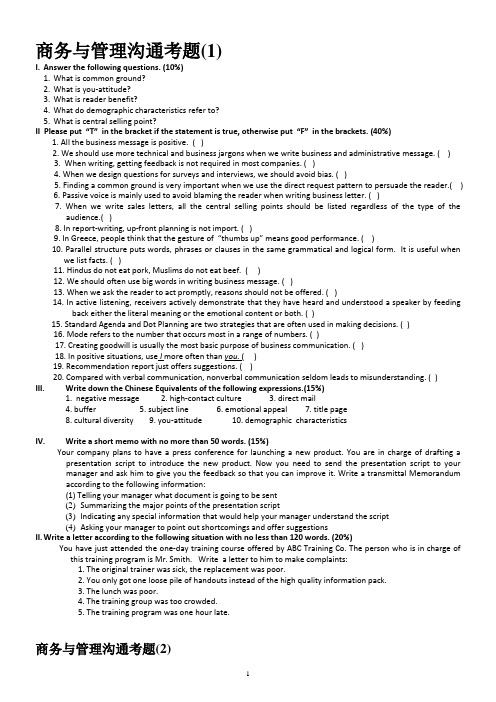
商务与管理沟通考题(1)I.Answer the following questions. (10%)1.What is common ground?2.What is you-attitude?3.What is reader benefit?4.What do demographic characteristics refer to?5.What is central selling point?II Please put “T” in the bracket if the statement is true, otherwise put “F” in the brackets. (40%)1. All the business message is positive. ( )2. We should use more technical and business jargons when we write business and administrativemessage. ( )3. When writing, getting feedback is not required in most companies. ( )4. When we design questions for surveys and interviews, we should avoid bias. ( )5. Finding a common ground is very important when we use the direct request pattern to persuade thereader.( )6. Passive voice is mainly used to avoid blaming the reader when writing business letter. ( )7. When we write sales letters, all the central selling points should be listed regardless of the type of theaudience.( )8. In report-writing, up-front planning is not import. ( )9. In Greece, people think that the gesture of “thumbs up” means good performance. ( )10. Parallel structure puts words, phrases or clauses in the same grammatical and logical form. It isuseful when we list facts. ( )11. Hindus do not eat pork, Muslims do not eat beef. ( )12. We should often use big words in writing business message. ( )13. When we ask the reader to act promptly, reasons should not be offered. ( )14. In active listening, receivers actively demonstrate that they have heard and understood a speaker byfeeding back either the literal meaning or the emotional content or both. ( )15. Standard Agenda and Dot Planning are two strategies that are often used in making decisions. ( )16. Mode refers to the number that occurs most in a range of numbers. ( )17. Creating goodwill is usually the most basic purpose of business communication. ( )18. In positive situations, use I more often than you. ( )19. Recommendation report just offers suggestions. ( )20. Compared with verbal communication, nonverbal communication seldom leads to misunderstanding.( )III.Write down the Chinese Equivalents of the following expressions.(15%)1. negative message2. high-contact culture3. direct mail4. buffer5. subject line6. emotional appeal7. title page8. cultural diversity 9. you-attitude 10. demographic characteristicsIV.Write a short memo with no more than 50 words. (15%)Your company plans to have a press conference for launching a new product. You are in charge of drafting a presentation script to introduce the new product. Now you need to send the presentation script to your manager and ask him to give you the feedback so that you can improve it. Write a transmittal Memorandum according to the following information:(1) Telling your manager what document is going to be sent(2)Summarizing the major points of the presentation script(3)Indicating any special information that would help your manager understand the script(4)Asking your manager to point out shortcomings and offer suggestionsII.W rite a letter according to the following situation with no less than 120 words. (20%)You have just attended the one-day training course offered by ABC Training Co. The person who is in charge of this training program is Mr. Smith. Write a letter to him to make complaints:1. The original trainer was sick, the replacement was poor.2. You only got one loose pile of handouts instead of the high quality information pack.3. The lunch was poor.4. The training group was too crowded.5. The training program was one hour late.商务与管理沟通考题(2)1. Answer the following questions.(1) Why is across-culture communication important?(2) What are the qualities of a successful international communicator?(3) What is culture and how to classify it?(4) Which is easier to arouse misunderstanding, the verbal communication or non-verbal communication?Why?(5) Search online and find more differences among cultures.2. Identify sources for miscommunicationIn the following situations, identify one or more ways that cultural differences may be leading to miscommunication.(1) To help her company open break into the Japanese market, Jane wants to hire a local interpreter whocan advise her on business customs. Her friend recommended Kana Tomari, a girl who is thought to be qualified for the job. When Kana Tomari presented her resume, Jane begins to wonder whether Kana Tomari will be competent or not because the resume didn’t provide details about any of the previous positions she has held.(2) Ma Ping works in a joint-venture company as an executive in China. His boss is an American namedSteve. They are good friends. Once, at a meeting with mostly Chinese participants including Ma Ping, Steve didn’t get much different ideas when asking for any suggestions on his new project. So he took it for granted that his new project would be quite satisfactory to everyone present at the meeting and decided to implement the plan. But to his great surprise and puzzlement, after the meeting, Ma Ping came to his office and told him that there were problems with the project, and the project might not work properly. This time, to Ma Ping’s surprise, Steve didn’t seem happy but even annoyed with this.(3)Mr. Jones praised Mr. Sugimoto, his subordinate, a Japanese, in the presence of other staff.Mr. Jones: Mr. Sugimono, I have notices that you are doing an excellent ob on the assembly line. I hope that the other workers notice how it should be done.Mr. Sugimono: (He is uneasy). Praise is not necessary. I am only doing my job. (He hopes other Japanese workers do not hear.)Mr. Jones: You are the finest, most excellent, dedicated worker we have ever had at the JonesCorporation.Mr. Sugimono: (He blushes and nods his head several times, and keeping working.)Mr. Jones: Well, are you going to say “Thank you,” Mr. Sugimono, or just remain silent?Mr. Sugimono: Excuse me, Mr. Jones… May I take a leave for five minutes?Mr. Jones: Sure. (He is annoyed and watches Sugimoto exit). I can’t believe how rude some Japanese workers are. They seem to be disturbed by praise and don’t answer you…just silent.商务与管理沟通考题(3)1. Answer the following questions.(1) What is communication channel?(2) What are the communication channels commonly used in business?(3) What are the advantages and drawbacks of each channel mention in this chapter?(4) What is the format of e-mail?(5) What is the format of fax?(6) How to choose an appropriate channel?2. Decide whether the following statements are true or false. Write “T” for true and “F” for false.(1) Letters and memorandums are used for communication with audience outside the organization. ( )(2) Letters are the best option for messages that are formal, private and confidential. ( )(3) Website gives information to the public. Interactive communication is not available. ( )(4) E-mails and faxes can be used to send confidential and private messages.(5) Since meetings are time-consuming, it is not frequently used for business communication. ( )(6) There is no need to confirm information exchanged over telephone. ( )(7) Reader’s preference is an important factor influencing the selection of communication channel. ( )(8) Subject line is optional for an e-mail. ( )3. Write an e-mail based on the following situations.Write an e-mail based on the following information to C. H. Powell at 20013, S. Rancho Way Rancho, Dominguez, CA 90220 , telling them that you wish to establish business relations with them.●Information about C. H. Powell is obtained from the Chamber of Commerce in California.●Your company specializes in freeze dried foodstuff such as freeze dried apple and freeze driedpotato.●Catalogues and price list will be enclosed, while samples will be sent separately.商务与管理沟通考题(4)I. Answer the following questions. (10%)1.What is common ground?2.What is you-attitude?3.What is reader benefit?4.What do demographic characteristics refer to?5.What is central selling point?II Please put “T” in the bracket if the statement is true, otherwise put “F” in the brackets. (40%)1. All the business message is positive. ( )2. We should use more technical and business jargons when we write business and administrative message. ( )3. When writing, getting feedback is not required in most companies. ( )4. When we design questions for surveys and interviews, we should avoid bias. ( )5. Finding a common ground is very important when we use the direct request pattern to persuade the reader. ( )6. Passive voice is mainly used to avoid blaming the reader when writing business letter. ( )7. When we write sales letters, all the central selling points should be listed regardless of the type of theaudience.( )8. In report-writing, up-front planning is not import. ( )9. In Greece, people think that the gesture of “thumbs up” me ans good performance. ( )10. Parallel structure puts words, phrases or clauses in the same grammatical and logical form. It is useful when welist facts. ( )11. Hindus do not eat pork, Muslims do not eat beef. ( )12. We should often use big words in writing business message. ( )13. When we ask the reader to act promptly, reasons should not be offered. ( )14. In active listening, receivers actively demonstrate that they have heard and understood a speaker by feeding backeither the literal meaning or the emotional content or both. ( )15. Standard Agenda and Dot Planning are two strategies that are often used in making decisions. ( )16. Mode refers to the number that occurs most in a range of numbers. ( )17. Creating goodwill is usually the most basic purpose of business communication. ( )18. In positive situations, use I more often than you. ( )19. Recommendation report just offers suggestions. ( )20. Compared with verbal communication, nonverbal communication seldom leads to misunderstanding. ( )III.Write down the Chinese Equivalents of the following expressions.(15%)1. negative message2. high-contact culture3. direct mail4. buffer5. subject line6. emotional appeal7. title page8. cultural diversity 9. you-attitude 10. demographic characteristicsIV.Write a short memo with no more than 50 words. (15%)Your company plans to have a press conference for launching a new product. You are in charge ofdrafting a presentation script to introduce the new product. Now you need to send the presentationscript to your manager and ask him to give you the feedback so that you can improve it. Write atransmittal Memorandum according to the following information:(1) Telling your manager what document is going to be sent(2)Summarizing the major points of the presentation script(3)Indicating any special information that would help your manager understand the script(4)Asking your manager to point out shortcomings and offer suggestionsII.Write a letter according to the following situation with no less than 120 words. (20%)You have just attended the one-day training course offered by ABC Training Co. The person who is in charge of this training program is Mr. Smith. Write a letter to him to make complaints:1. The original trainer was sick, the replacement was poor.2. You only got one loose pile of handouts instead of the high quality information pack.3. The lunch was poor.4. The training group was too crowded.5. The training program was one hour late.思考题:第一单元思考题1. What is communication?2. How important is it to the business world?3.How many communication channels do you know?4. What is effective business communication?5.How to be a successful business person?第二单元思考题1. What is goodwill?2. How important is goodwill building in business?3. How to build goodwill?4.What is the relation between power and tone?第三单元思考题1. What are the ways through which you can know your audience?2. How to reach your audience?3.How to adapt your message to your audience?4.What needs do people have in life and at work?第四单元思考题1. What is the good style in Business and Administrative writing?2. What are the miths people have about good writing style?3. How to make the writing clear and easy to read?第五单元思考题1. What are the acitivities involved in business writing?2. How important is good plan to the business writing?3. How to get and use feedback in business writing?4. What's the difference between revising, editing and proofreading?第七单元思考题1.What is informative message? How to organize it?2.Waht is positive message? How to organize it?3.What is the format for letter, memo, not, e-mail, report and proposal?4. What is the function of subject line?5. Should way use the same tone when writing to the superior, the peers and the subordinates?第八单元思考题1.What is negative message?2. How to deal with the negative information when writing?3.What are the components of negative message? What are the functions of them?第九单元思考题1.What is persuasive message?2. What are the strategies you may use to persuade the other people?3. How important is it to find a common ground in writing persuasive message?4.What are the components of persuasive message? Whar are the functions of them? 第十单元思考题1. Waht are the strategies you may use when you persuade other people to buy goods from you?2. What is the strategy for writing sales letters?3.Waht are the components of a sales letter?4. How to use emotional appeal in writing sales letter?第十一单元思考题1. What is cultural competence? How to get it?2. What are the diversities in the business world that could affect the effectiveness of communication?3.How different are the cultures in the world?4. How to eliminate cultural difference in business globally?第十二单元思考题1. What is teamwork?2. How to work and write in groups?3. How important is active listening to the group working?4.How to have effective group interactions?第十三单元思考题1. Waht are the varieties of report?2.How to organize report?3. What is the format of report?4.How to define report problems?4.How to design questions for surveys and interviews?5.How to analyze data and information for reports?第十七单元思考题1. How to make preparations for job hunting?2. How important is resume for job hunting?3. What is the format for English Resume?4. How to shine in resume writing?第十八单元思考题1. What is job application letter?]2. How is it different from the resume?3. How to organize a job applicaiton letter?4. What is the format for it?第十九单元思考题1. Waht is job interview?2. How to make preparations for the job interview?3. How to shine at the job interview?4. How to deal with the traditional questions at the job interview?。
商务沟通方法与技能自考题模拟2_真题(含答案与解析)-交互
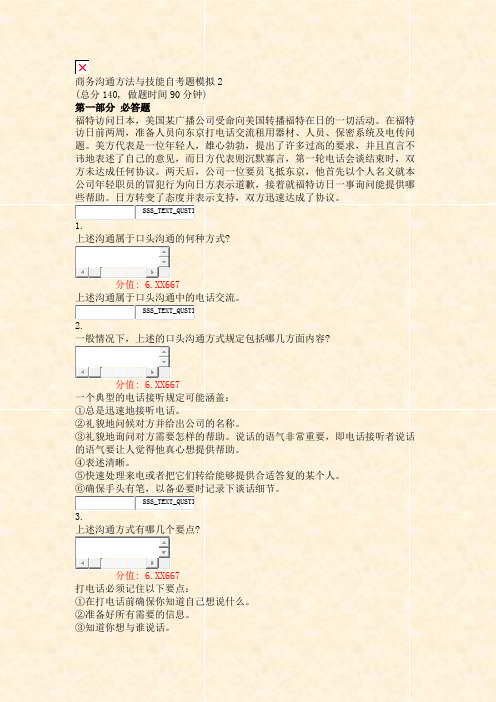
商务沟通方法与技能自考题模拟2(总分140, 做题时间90分钟)第一部分必答题福特访问日本,美国某广播公司受命向美国转播福特在日的一切活动。
在福特访日前两周,准备人员向东京打电话交流租用器材、人员、保密系统及电传问题。
美方代表是一位年轻人,雄心勃勃,提出了许多过高的要求,并且直言不讳地表述了自己的意见,而日方代表则沉默寡言,第一轮电话会谈结束时,双方未达成任何协议。
两天后,公司一位要员飞抵东京,他首先以个人名义就本公司年轻职员的冒犯行为向日方表示道歉,接着就福特访日一事询问能提供哪些帮助。
日方转变了态度并表示支持,双方迅速达成了协议。
SSS_TEXT_QUSTI1.上述沟通属于口头沟通的何种方式?分值: 6.XX667上述沟通属于口头沟通中的电话交流。
SSS_TEXT_QUSTI2.一般情况下,上述的口头沟通方式规定包括哪几方面内容?分值: 6.XX667一个典型的电话接听规定可能涵盖:①总是迅速地接听电话。
②礼貌地问候对方并给出公司的名称。
③礼貌地询问对方需要怎样的帮助。
说话的语气非常重要,即电话接听者说话的语气要让人觉得他真心想提供帮助。
④表述清晰。
⑤快速处理来电或者把它们转给能够提供合适答复的某个人。
⑥确保手头有笔,以备必要时记录下谈话细节。
SSS_TEXT_QUSTI3.上述沟通方式有哪几个要点?分值: 6.XX667打电话必须记住以下要点:①在打电话前确保你知道自己想说什么。
②准备好所有需要的信息。
③知道你想与谁说话。
④说话简明扼要。
⑤如果要找的人不在,留言须清晰。
某跨国公司组织了一场面试,一位衣着整洁、文质彬彬的年轻人一进门,就给面试官留下了深刻印象。
因为是在校园内部举行的面试,所以面试者大都为学生,多着学生装,尽管这位年轻人作为一名学生并不算出色,但其出色的交谈技巧与令人印象深刻的衣着,最终使得他被录取了。
SSS_TEXT_QUSTI4.上述主人公给对方留下的良好印象,源于何种非语言沟通方式?分值: 6.XX667个人外表给对方留下的良好印象。
商务运营管理试题样卷

中英合作商务管理专业管理段证书课程考试商务运营管理试题(课程代码11748)考生必须回答A部分的所有问题和B部分的两个问题。
1.下列哪一项陈述最好地描述了医院的直接顾客?A。
医生B。
护士C。
患者D。
药物制造商2。
下列哪一项陈述最好地定义了过程这个术语?A。
将输出转化为所需输人的一系列工作或活动B。
将输人转化为所需输出的一系列工作或活动C.将输出转化成顾客满意的一系列工作或活动D。
将顾客满意度转化为输人的一系列工作或活动3。
下列哪一个属于制造业的一个例子?A。
美发 B.汽车修理C.烹任D。
帽子制造4.下列那一项成熟最好地描述了控制系统?A.调差外部-内部过程,测量结果,运用统计进行比较,与既定的标准比较,然后做出决策修改过程B.调查外部一内部过程,测量结果,确定期望的标准并修改过程C。
调查外部一内部过程,与既定标准比较并修改过程D.调查外部一内部过程,测量结果,然后修改过程5.下列哪一项陈述最好地描述了运营经理的人力资源管理角色?A。
工作设计,薪酬体系与组织,教育与培训以及行业关系B。
工作设计,教育与培训以及行业关系C.教育与培训以及行业关系D。
行业关系6。
下列哪一项陈述最好地描述了"最优生产技术”的目的?A.最优生产技术是一个支持生产的计算机程序包B。
最优生产技术是一个改进生产技术的计算机程序包C.最优生产技术是一个改进生产准备过程的计算机程序包D.最优生产技术是一个识别生产瓶颈的计算机程序包7.下列哪一项陈述最好地描述了运营管理背景下的转化过程?A。
转化过程包括在运营过程中输出到输入的转化 B。
转化过程包括原材料向成品的转化C。
转化过程包括信息向服务的转化D。
转化过程包括在运营过程中输入向输出的转化8。
下列哪一个是现代服务技术的例子?A。
理发师使用的剪刀B。
秘书使用的打字机C。
外科医生使用的激光 D.前台接待人员使用的电话9。
下列哪一项陈述最好地描述了工作计划?A。
工作计划包括建立确定组织未来计划的程序B。
商务沟通与谈判真题
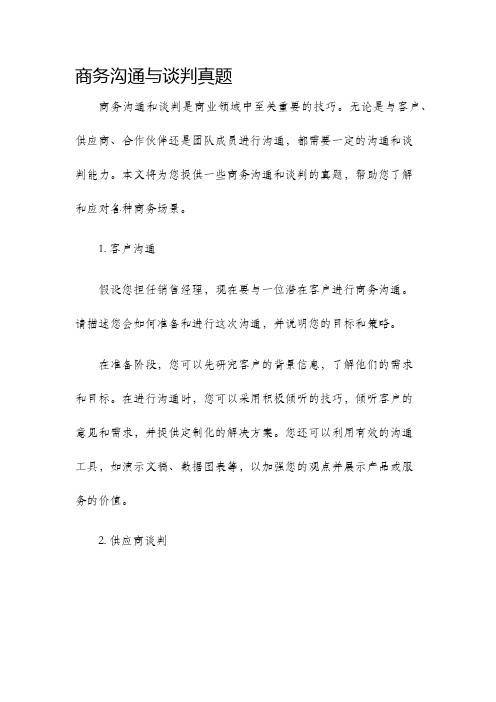
商务沟通与谈判真题商务沟通和谈判是商业领域中至关重要的技巧。
无论是与客户、供应商、合作伙伴还是团队成员进行沟通,都需要一定的沟通和谈判能力。
本文将为您提供一些商务沟通和谈判的真题,帮助您了解和应对各种商务场景。
1. 客户沟通假设您担任销售经理,现在要与一位潜在客户进行商务沟通。
请描述您会如何准备和进行这次沟通,并说明您的目标和策略。
在准备阶段,您可以先研究客户的背景信息,了解他们的需求和目标。
在进行沟通时,您可以采用积极倾听的技巧,倾听客户的意见和需求,并提供定制化的解决方案。
您还可以利用有效的沟通工具,如演示文稿、数据图表等,以加强您的观点并展示产品或服务的价值。
2. 供应商谈判假设您是一家制造企业的采购经理,需要与供应商进行谈判以获取最佳价格和质量。
请描述您将如何准备和进行这次谈判,并提供一些谈判策略和技巧。
在准备阶段,您可以先研究供应商的价格结构、竞争对手的报价以及市场行情的动态。
在进行谈判时,您可以采用合作的态度,并展示出对供应商的尊重和信任。
您可以运用一些谈判策略,如议价、多个报价对比等,以获取最佳交易条件。
同时,您还可以采用沟通技巧,如建立互惠关系、提出合理的要求等,以满足您的需求和供应商的利益。
3. 合作伙伴关系管理假设您在一家跨国公司担任项目经理,需要与全球不同文化背景的合作伙伴进行沟通和协作。
请描述您将如何管理这些合作伙伴关系,并提供一些跨文化沟通的技巧。
在管理合作伙伴关系时,您可以采用开放的沟通和透明的决策过程,以建立信任和合作。
您可以尊重并适应不同文化背景的差异,注意语言和非语言沟通的差异,并尽可能提供有关文化差异的培训。
商务沟通选择、判断答案
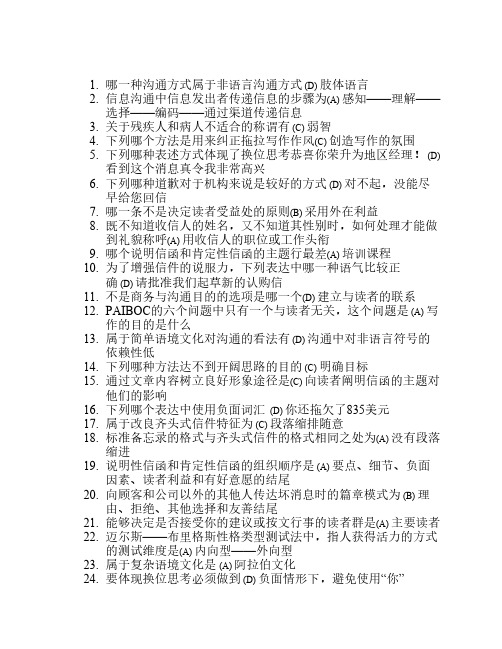
1. 哪一种沟通方式属于非语言沟通方式 (D) 肢体语言2. 信息沟通中信息发出者传递信息的步骤为(A) 感知——理解——选择——编码——通过渠道传递信息3. 关于残疾人和病人不适合的称谓有 (C) 弱智4. 下列哪个方法是用来纠正拖拉写作作风(C) 创造写作的氛围5. 下列哪种表述方式体现了换位思考恭喜你荣升为地区经理! (D)看到这个消息真令我非常高兴6. 下列哪种道歉对于机构来说是较好的方式 (D) 对不起,没能尽早给您回信7. 哪一条不是决定读者受益处的原则(B) 采用外在利益8. 既不知道收信人的姓名,又不知道其性别时,如何处理才能做到礼貌称呼(A) 用收信人的职位或工作头衔9. 哪个说明信函和肯定性信函的主题行最差(A) 培训课程10. 为了增强信件的说服力,下列表达中哪一种语气比较正确 (D) 请批准我们起草新的认购信11. 不是商务与沟通目的的选项是哪一个(D) 建立与读者的联系12. PAIBOC的六个问题中只有一个与读者无关,这个问题是 (A) 写作的目的是什么13. 属于简单语境文化对沟通的看法有 (D) 沟通中对非语言符号的依赖性低14. 下列哪种方法达不到开阔思路的目的 (C) 明确目标15. 通过文章内容树立良好形象途径是(C) 向读者阐明信函的主题对他们的影响16. 下列哪个表达中使用负面词汇 (D) 你还拖欠了835美元17. 属于改良齐头式信件特征为 (C) 段落缩排随意18. 标准备忘录的格式与齐头式信件的格式相同之处为(A) 没有段落缩进19. 说明性信函和肯定性信函的组织顺序是 (A) 要点、细节、负面因素、读者利益和有好意愿的结尾20. 向顾客和公司以外的其他人传达坏消息时的篇章模式为 (B) 理由、拒绝、其他选择和友善结尾21. 能够决定是否接受你的建议或按文行事的读者群是(A) 主要读者22. 迈尔斯——布里格斯性格类型测试法中,指人获得活力的方式的测试维度是(A) 内向型——外向型23. 属于复杂语境文化是(A) 阿拉伯文化24. 要体现换位思考必须做到 (D) 负面情形下,避免使用“你”25. 通过文章的结构树立良好形象途径是(D) 内容的组织要以读者的需求为准而不是以作者的需求为准26. 哪个表达语句强调读者能做的事而不是对读者的种种限制(D) 在新的VISA信用卡上您可赊购1500美元27. 好的读者受益处的特征是(C) 适合具体听众28. 下列哪一项不是说明性信函的主要目的(D) 树立作者的良好形象29. 下列哪种情况需要说明读者受益处 (C) 阐述政策30. 向上司报告坏消息采取信函模式为 (C) 讨论问题、阐述细节、提供其他选择和请求采取措施31. 分析你和读者沟通的PAIBOC的问题中指读者或听众是哪些人的问题是 (B) Audience32. 哪一项属于公文写作策略(D) 选择能引起特殊读者兴趣和符合其利益的办法33. 下列句子中,那一句有性别歧视倾向(B) 每个主管都必须保证,他的部门提交的时间表准确无误34. 通过检查文稿确保没有排字错误属于 (B) 校对35. 哪句话没有体现了“在负面情形下,避免使用‘你’”的换位思考策略 (A) 您没有在支票上签字36. 下列表达的语气中最没有礼貌的是 (A) 在星期一之前上交考勤卡37. 属于推销活动中的外在激励因素的是 (C) 解决工作上的问题38. 在信函中除了采用礼貌的称呼外,姓名的格式也要对应,下列哪种表达格式对应 (B) 委员会的成员将是琼斯、雅克尼和利萨39. 哪一项是负面信函的主要目的 (D) 尽可能保持友善的态度40. 下列哪种情况可以采用直接请求式的劝说策略 (B) 读者会按照你的要求去做,不会有任何抵触情绪1、商务写作的风格通常是正式的,华丽的辞藻、长句子与长段落常被看好正确答案:说法错误2、读者决定写作的目的和你怎样达到这些目的正确答案:说法错误3、简单语境文化指语言所处上下文不太重要,大部分信息需要清楚明白地“表达出来”的文化。
《商务礼仪》测试题及答案
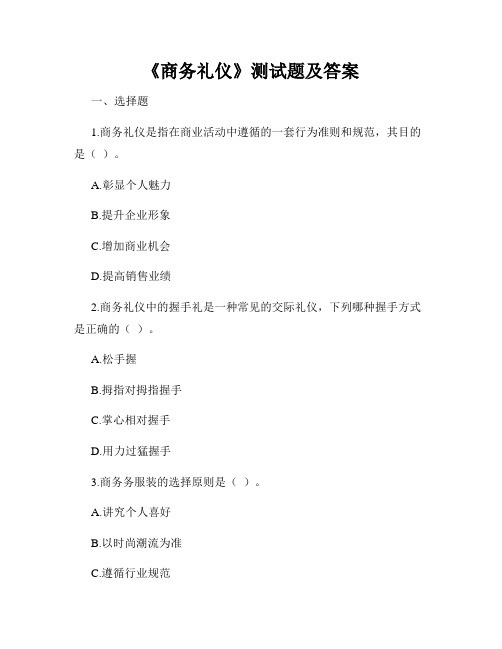
《商务礼仪》测试题及答案一、选择题1.商务礼仪是指在商业活动中遵循的一套行为准则和规范,其目的是()。
A.彰显个人魅力B.提升企业形象C.增加商业机会D.提高销售业绩2.商务礼仪中的握手礼是一种常见的交际礼仪,下列哪种握手方式是正确的()。
A.松手握B.拇指对拇指握手C.掌心相对握手D.用力过猛握手3.商务务服装的选择原则是()。
A.讲究个人喜好B.以时尚潮流为准C.遵循行业规范D.尽可能突出个性4.商务宴会中的座位次序一般是按照()进行安排。
A.嘉宾的级别高低B.年龄大小C.性别D.先来后到的时间顺序5.商务电话中,以下哪种说法是正确的()。
A.用口音浓重的方言交流B.随意挂断电话C.礼貌地自我介绍D.随便使用缩略语和俚语二、判断题1.商务礼仪中,面带微笑可以给人留下良好的第一印象。
()2.商务函件中,应使用正式的称呼和客套语言。
()3.商务礼仪中,碰杯时不可以与对方交叉碰杯。
()4.商务会议中,手机应该开启静音模式,避免打扰他人。
()5.商务拜访时,在对方办公室内要注意不要触摸私人物品。
()三、简答题1.商务场合中的仪容仪表要求有哪些?2.商务会议中应该如何表现自己的礼仪修养?3.商务拜访中有哪些应注意的礼仪细节?4.商务宴会中如何应对饮酒礼仪?5.商务旅行中应该如何做到礼仪得体?四、问答题1.商务礼仪的重要性是什么?请举例说明。
2.商务礼仪与个人形象有什么关联?如何通过商务礼仪提升个人形象?3.商务场合中,如何处理面对突发状况时的礼仪问题?4.商务礼仪如何帮助企业建立良好的品牌形象?5.在国际商务交往中,不同国家的商务礼仪有何不同?请举例说明。
参考答案一、选择题1. B.提升企业形象2. C.掌心相对握手3. C.遵循行业规范4. A.嘉宾的级别高低5. C.礼貌地自我介绍二、判断题1.√2.√3.×4.√5.√三、简答题1. 商务场合中的仪容仪表要求包括穿着整洁、干净,选择合适合体的商务服装,在妆容和发型上保持端庄得体,注意口腔清洁和体味管理。
商务工作试题答案

商务工作试题答案一、选择题1. 在商务谈判中,以下哪项是建立良好关系的关键因素?A. 坚持己方立场B. 理解对方需求C. 忽略文化差异D. 只关注价格因素答案:B. 理解对方需求2. 供应链管理的核心目标是什么?A. 降低成本B. 提高效率C. 优化库存D. 所有以上选项答案:D. 所有以上选项3. 以下哪个不是有效的市场细分策略?A. 地理细分B. 人口统计细分C. 心理细分D. 随机细分答案:D. 随机细分4. 在国际贸易中,最常用的支付方式是什么?A. 信用证B. 汇票C. 电汇D. 支票答案:A. 信用证5. 以下哪项不是有效的客户服务策略?A. 快速响应B. 个性化服务C. 高成本维护D. 反馈机制答案:C. 高成本维护二、填空题1. 在商务沟通中,__________ 是指在没有直接面对面交流的情况下,通过书面、电子或其他非直接方式进行的信息交流。
答案:远程沟通2. 供应链中的库存管理是为了确保产品在需要时能够__________ 可用。
答案:及时3. 市场调研的目的是收集和分析信息,以便更好地了解__________、竞争对手和市场趋势。
答案:消费者4. 国际贸易中的关税是指政府对进口或出口商品征收的__________。
答案:税费5. 客户关系管理(CRM)系统的主要目的是__________ 客户信息,以便提供更好的服务和增加销售。
答案:整合三、简答题1. 描述商务谈判中的BATNA概念及其重要性。
BATNA(最佳替代方案)是指在谈判失败时,谈判者可以选择的最佳替代行动方案。
了解BATNA的重要性在于,它为谈判者提供了一个明确的底线,帮助他们在谈判中保持清晰的方向和目标。
知道自己的BATNA 可以让谈判者在谈判中更有信心,因为它确保了即使谈判没有达成理想的结果,也有一个可靠的备选方案。
2. 说明品牌忠诚度对企业的重要性。
品牌忠诚度是指消费者对特定品牌的持续偏好和重复购买行为。
这对企业至关重要,因为忠诚的顾客不仅提供了稳定的收入来源,而且还通过口碑营销为企业带来新的客户。
商务沟通技巧(满分答案)
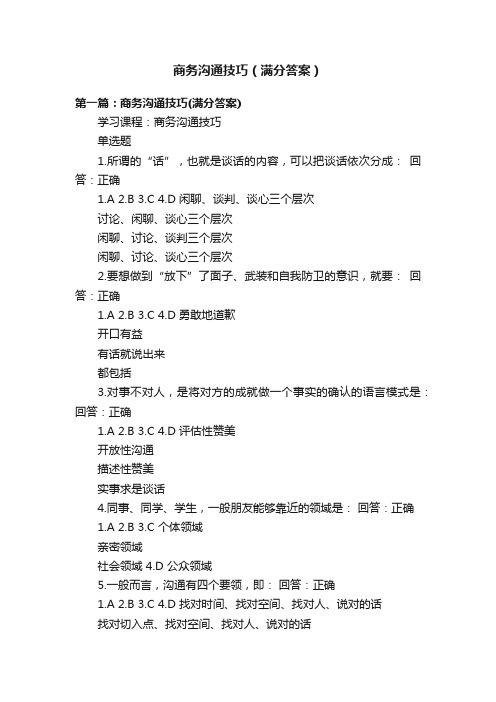
商务沟通技巧(满分答案)第一篇:商务沟通技巧(满分答案)学习课程:商务沟通技巧单选题1.所谓的“话”,也就是谈话的内容,可以把谈话依次分成:回答:正确1.A2.B3.C4.D 闲聊、谈判、谈心三个层次讨论、闲聊、谈心三个层次闲聊、讨论、谈判三个层次闲聊、讨论、谈心三个层次2.要想做到“放下”了面子、武装和自我防卫的意识,就要:回答:正确1.A2.B3.C4.D 勇敢地道歉开口有益有话就说出来都包括3.对事不对人,是将对方的成就做一个事实的确认的语言模式是:回答:正确1.A2.B3.C4.D 评估性赞美开放性沟通描述性赞美实事求是谈话4.同事、同学、学生,一般朋友能够靠近的领域是:回答:正确1.A2.B3.C 个体领域亲密领域社会领域 4.D 公众领域5.一般而言,沟通有四个要领,即:回答:正确1.A2.B3.C4.D 找对时间、找对空间、找对人、说对的话找对切入点、找对空间、找对人、说对的话找对时间、摆正态度、找对人、说对的话找对时间、找对空间、找对人、使用眼神6.在商务沟通时,若碰到对方咄咄逼人,或固执己见时,不妨快速转换语词和态度,使现场气氛缓和下来而使用的方法是:回答:正确1.A2.B3.C4.D 分段式沟通法同理心沟通法主动趋前法及时逆转法7.在商务沟通的过程中,若你多使用问句,就往往可以:回答:正确1.A2.B3.C4.D 避免替对方下决定听出对方的需求帮助我度过那段低潮期收集对方信息的过程8.管理学上有一个倒金字塔模式,表示若要对方接纳我们的意见,首先是要:回答:正确1.A2.B3.C 原谅他人的过错了解对方的需求有良好的沟通技巧 4.D 建立信赖关系9.用人的性格来衡量一个人的受欢迎程度是比较具体的指针,包括这个人:回答:正确1.A 词2.B3.C4.D 出手大方身体的自由度以上都包括拥有宽宏的气度、谈笑风生的本事、善解人意的言10.在沟通管理学上,肢体语言占了55%的分量,而肢体语言中居首位的是:回答:正确1.A2.B3.C4.D 微笑点头手势眼神11.人际关系是互动的,需要你摆正位置,端正态度:回答:正确1.A2.B3.C4.D 客随主便,尊重客人主随客便,尊重客人态度和蔼,缩小距离摆正位置,端正态度12.下面列举的衔接句在同事之间不宜运用的是:回答:正确1.A2.B 好了3.C 我了解你的意思太棒了,我佩服你的见解哇!你真厉害,全办公室没有一个同事比你干得更4.D 有意思,你的见解很特别13.下列谈话中属于评估性言词的一句是:回答:正确1.A2.B3.C 谢你4.D 这个项目你做得很用心,不错,加油!比起那一组,你们的进度差太多了这个企划案还可以做点修正,一定会更好你的努力和创意让公司收获很多,实在应该好好感14.只有很亲近的人才能靠近的亲密领域是个人方圆:回答:正确1.A2.B3.C4.D 1.25米至3.5米0.5米至1.25米0.5米以内没有固定值15.同理心沟通法的主要诀窍在于:回答:正确1.A2.B3.C4.D 尊重对方有自由空间的要求我跟你一样,以前有一次糗大了组织同事一起参加培训陪对方下楼,再带领对方上楼第二篇:商务沟通技巧答案课后测试单选题1.所谓的“话”,也就是谈话的内容,可以把谈话依次分成:√ A 闲聊、谈判、谈心三个层次B讨论、闲聊、谈心三个层次C闲聊、讨论、谈判三个层次 D闲聊、讨论、谈心三个层次正确答案:D 2.纯粹凭借第六感觉进行的一种心与心的联系是:√ A非肢体接触 B心灵接触 C直接接触 D间接接触正确答案: B 3.学习礼仪首先要:√ A客随主便,尊重客人 B主随客便,尊重客人 C态度和蔼,缩小距离 D摆正位置,端正态度正确答案:D 4.要想做到“放下”了面子、武装和自我防卫的意识,就要:A勇敢地道歉 B开口有益 C有话就说出来 D都包括√ 正确答案:D 5.同事、同学、学生,一般朋友能够靠近的领域是:√ ABCD个体领域亲密领域社会领域公众领域正确答案: A 6.一般而言,沟通有四个要领,即:√ ABCD找对时间、找对空间、找对人、说对的话找对切入点、找对空间、找对人、说对的话找对时间、摆正态度、找对人、说对的话找对时间、找对空间、找对人、使用眼神正确答案: A 7.化解误会下列的正确方法是:√ ABCD不要意气用事不要急于辩解学会一笑置之以上都包括正确答案:D 8.在商务沟通时,若碰到对方咄咄逼人,或固执己见时,不妨快速转换语词和态度,使现场气氛缓和下来而使用的方法是:√ ABCD分段式沟通法同理心沟通法主动趋前法及时逆转法正确答案:D 9.在商务沟通的过程中,若你多使用问句,就往往可以:× A避免替对方下决定 B听出对方的需求 C帮助我度过那段低潮期 D收集对方信息的过程正确答案: B 10.用人的性格来衡量一个人的受欢迎程度是比较具体的指针,包括这个人:√ A拥有宽宏的气度、谈笑风生的本事、善解人意的言词 B出手大方 C身体的自由度 D以上都包括正确答案:D 11.我们不应该使用的语言表达模式是:× A赞赏性语言模式 B破坏性语言模式 C描述性语言模式 D建设性语言模式正确答案: B 12.通常我们在和别人沟通时,和有些人挺能谈得来,和有些人却三句话都嫌多,这是因为对话时:A双方没有共同语言B 没有使用肯定语词C他的自我防卫和攻击性过于强烈 D个人主观意识太强烈正确答案: D 13.下列谈话中属于评估性言词的一句是:√ A比起那一组,你们的进度差太多了√ BCD这个企划案还可以做点修正,一定会更好你的努力和创意让公司收获很多,实在应该好好感谢你这个项目你做得很用心,不错,加油!正确答案: A 14.柔性又不失积极的沟通方法,通过这种民主式的方法,可以让对方感觉主动权在他手里,心里会比较舒服,也比较容易接受,使很多行动更快地实现。
商务智商测试题目及答案

商务智商测试题目及答案一、选择题(每题2分,共20分)1. 商务谈判中,以下哪项不是有效沟通的要素?A. 清晰表达B. 情绪控制C. 单向信息传递D. 倾听理解2. 在商务环境中,以下哪项不是团队合作的关键因素?A. 明确目标B. 个人主义C. 相互尊重D. 有效沟通3. 以下哪项不是商务礼仪中的基本要求?A. 准时B. 着装得体C. 随意打断他人D. 礼貌用语4. 商务会议中,以下哪项不是有效会议的基本原则?A. 明确议程B. 会议时间控制C. 随意更改会议主题D. 会议记录5. 在商务场合中,以下哪项不是建立信任的方法?A. 诚实守信B. 保守商业秘密C. 随意泄露信息D. 履行承诺6. 商务报告中,以下哪项不是报告撰写的关键要素?A. 客观数据B. 主观臆断C. 清晰结构D. 准确结论7. 商务计划中,以下哪项不是制定计划的步骤?A. 目标设定B. 资源评估C. 随意执行D. 风险评估8. 在商务谈判中,以下哪项不是谈判策略?A. 让步策略B. 强硬策略C. 拖延时间D. 合作策略9. 商务环境中,以下哪项不是有效领导的特质?A. 决策能力B. 情绪化管理C. 激励团队D. 明确指导10. 商务分析中,以下哪项不是数据分析的关键步骤?A. 数据收集B. 数据整理C. 直觉判断D. 数据解释答案:1. C2. B3. C4. C5. C6. B7. C8. C9. B 10. C二、简答题(每题5分,共30分)1. 简述商务谈判中常见的五种谈判技巧。
2. 描述商务礼仪中餐桌礼仪的五个要点。
3. 解释商务会议中如何有效控制会议时间。
4. 阐述商务报告撰写中如何确保报告的客观性和准确性。
5. 列举商务计划制定过程中需要考虑的四个关键因素。
6. 说明商务环境中有效领导应具备的三个核心能力。
答案:1. 商务谈判技巧包括:(1) 明确目标;(2) 倾听和理解对方;(3) 灵活运用让步策略;(4) 保持冷静;(5) 创造性地解决问题。
管理沟通务实模拟试题

管理沟通务实模拟试题
管理沟通务实模拟试题:
一、场景设定
某公司项目组由不同部门成员组成,需要开展合作以完成一项重要项目。
然而,由于各部门之间存在沟通不畅,导致项目进展缓慢,给整个项目的顺利进行带来了困难。
二、任务要求
你作为项目组的管理者,请设计一份管理沟通务实模拟试题,以期提高团队成员之间的沟通效率,促进项目进展。
三、模拟试题
1. 请阐述你对沟通在项目管理中的重要性的理解,并给出具体的案例说明。
2. 你认为项目组成员在沟通过程中最容易出现的问题是什么?请列举并提出解决方案。
3. 在项目推进过程中,如果发现某个部门的负责人出现了与其他成员的沟通问题,你将如何解决?请列出具体的沟通改进措施。
4. 对于团队协作中可能出现的分歧和冲突,你认为应该如何化解?请提出一套有效的沟通方案。
5. 当项目面临临时变动或者危机时,项目团队成员之间的沟通应该如何及时有效地处理?请描述你的处理流程。
四、总结
通过本次管理沟通务实模拟试题,希望能够使项目团队成员在今后的合作中更加注重沟通与交流,减少沟通障碍,提高团队合作效率,确保项目的顺利进行和成功完成。
- 1、下载文档前请自行甄别文档内容的完整性,平台不提供额外的编辑、内容补充、找答案等附加服务。
- 2、"仅部分预览"的文档,不可在线预览部分如存在完整性等问题,可反馈申请退款(可完整预览的文档不适用该条件!)。
- 3、如文档侵犯您的权益,请联系客服反馈,我们会尽快为您处理(人工客服工作时间:9:00-18:30)。
商务与管理沟通考题
1. Answer the following questions.
(1) Why is across-culture communication important?
(2) What are the qualities of a successful international communicator?
(3) What is culture and how to classify it?
(4) Which is easier to arouse misunderstanding, the verbal communication or
non-verbal communication? Why?
(5) Search online and find more differences among cultures.
2. Identify sources for miscommunication
In the following situations, identify one or more ways that cultural differences may be leading to miscommunication.
(1) To help her company open break into the Japanese market, Jane wants to hire a
local interpreter who can advise her on business customs. Her friend recommended Kana Tomari, a girl who is thought to be qualified for the job.
When Kana Tomari presented her resume, Jane begins to wonder whether Kana Tomari will be competent or not because the resume didn’t provide details about any of the previous positions she has held.
(2) Ma Ping works in a joint-venture company as an executive in China. His boss is
an American named Steve. They are good friends. Once, at a meeting with mostly Chinese participants including Ma Ping, Steve didn’t get much different ideas when asking for any suggestions on his new project. So he took it for granted that his new project would be quite satisfactory to everyone present at the meeting and decided to implement the plan. But to his great surprise and puzzlement, after the meeting, Ma Ping came to his office and told him that there were problems with the project, and the project might not work properly. This time, to Ma Ping’s surprise, Steve didn’t seem happy but even annoyed with this.
(3)Mr. Jones praised Mr. Sugimoto, his subordinate, a Japanese, in the presence of
other staff.
Mr. Jones: Mr. Sugimono, I have notices that you are doing an excellent ob on the assembly line. I hope that the other workers notice how it should
be done.
Mr. Sugimono: (He is uneasy). Praise is not necessary. I am only doing my job. (He hopes other Japanese workers do not hear.)
Mr. Jones: You are the finest, most excellent, dedicated worker we have ever had at the Jones Corporation.
Mr. Sugimono: (He blushes and nods his head several times, and keeping working.) Mr. Jones: Well, are you going to say “Thank you,”Mr. Sugimono, or just remain silent?
Mr. Sugimono: Excuse me, Mr. Jones… May I take a leave for five minutes?
Mr. Jones: Sure. (He is annoyed and watches Sugimoto exit). I can’t believe how rude some Japanese workers are. They seem to be disturbed by
praise and don’t answer you…just silent.。
